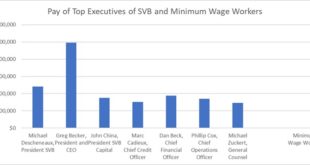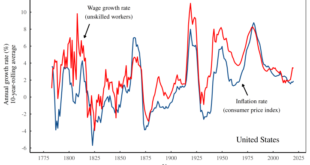… contains the seed of a good idea but his version is an inequitable mess That’s the headline for my latest piece in the Guardian , over the fold It is always disappointing when an important, and potentially transformational, policy idea is introduced in a form that almost certainly guarantees its rejection. That’s even more true in the context of an election campaign, where reasoned analysis of policy invariably takes a back seat to partisan polemics. Dominic...
Read More »SVB was Donald Trump’s bailout
from Dean Baker There are two key points that people should recognize about the decision to guarantee all the deposits at Silicon Valley Bank (SVB): It was a bailout Donald Trump was the person responsible. The first point is straightforward. We gave a government guarantee of great value to people who had not paid for it. We will get a lot of silly game playing on this issue, just like we did back in 2008-09. The game players will tell us that this guarantee didn’t cost the government a...
Read More »Open thread March 14, 2023
The answer to the Silicon Valley bank bailout: Federal Reserve Banking
from Dean Baker Word from the grapevine is that the risk of contagion may cause the Fed or the FDIC to engineer some sort of bailout of uninsured deposits, where they get paid back in full, instead of being forced to accept a partial loss on deposits over $250k. That would be unfortunate, since the people who run these companies that have large deposits are supposed to be brilliant whizzes, who should be able to understand things like FDIC deposit insurance limits. Their incessant...
Read More »Weekend satire: The key to managing inflation? Higher wages
from Blair Fix To manage inflation, governments have a simple tool at their disposal: raise wages as fast as possible.— Milton Fryman For the last few months, I’ve been diving into the economics of inflation. In this post, I’m excited to review some forgotten history. Our journey starts with a basic question: what is the key policy tool for managing the rate of inflation? According to mainstream economics, the key tool is the rate of interest. Hike this rate, economists argue, and you...
Read More »Bloodlands
Just finished reading “Bloodlands,” a book by Yale historian Timothy Snyder. It was published in 2010, but now has a lengthy afterword that discusses the book’s reception and ties the theme to current events. I was inspired to read this book because of events in Ukraine and I believe that I have a much better understanding of the current conflict from having read it.The bloodlands refers to the territory lying between central Poland and, roughly, the...
Read More »I Am Tired
Hey, if you have not noticed, I have been doing most of the posting at Angry Bear, for myself, others, and for NDd on Angry Bear on various topics. NDd’s commentary I consider to be important and timely reporting on housing, jobs, Covid, the economy, etc. He is on the money each time. It is amazing to me, how the FED keeps trying to blow the economy up and it keeps on ticking. There are a lot of reasons for such a great economy, none of which...
Read More »Red Alert’ is a paper tiger
That’s the headline for my latest piece in Independent Australia, responding to some appalling warmongering from the Nine papers. The main point is that a seaborne invasion of Taiwan would be doomed to failure. Everyone knows this, but all the important players have good reason to deny it. Share this:Like this:Like Loading...
Read More »Have we reached electricity’s carbon-free tipping point?
That’s the title of my latest piece in Inside Story, expanding on this recent post. More over the fold Looking at recent news on global heating, it’s easy to give way to despair. After a brief slowdown during the lockdown phase of the Covid pandemic emissions of greenhouse gases have continued to rise. Even coal, which reached a plateau in 2013, bounced back as a result of the cutoff of Russian gas, hit an all-time high in 2022. But there are some bright spots. In particular,...
Read More »Getting causality into statistics
Lars Syll Because statistical analyses need a causal skeleton to connect to the world, causality is not extra-statistical but instead is a logical antecedent of real-world inferences. Claims of random or “ignorable” or “unbiased” sampling or allocation are justified by causal actions to block (“control”) unwanted causal effects on the sample patterns. Without such actions of causal blocking, independence can only be treated as a subjective exchangeability assumption whose justification...
Read More » Heterodox
Heterodox



